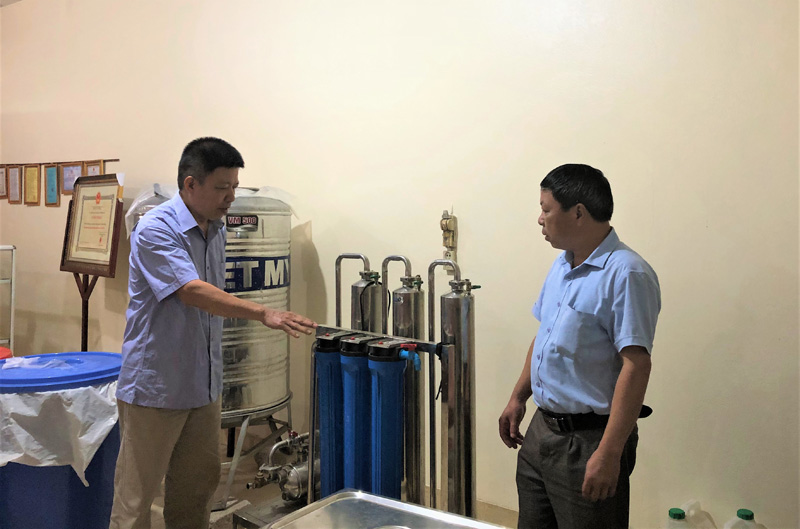
(HBO) - In 2019, Lau Sieu alcohol was recognized as an 3-star OCOP product. This is a private trademark of Vi Thi Ton business household in Chieng Ha hamlet, Mai Ha commune (Mai Chau). With the hope that Lau Sieu alcohol would be sustainably developed, Ms. Vi Thi Ton's family has boldly expanded its scale and has applied the advanced technology in completing the product, using detoxification filter system in alcohol elements and the technology reducing the shock of alcohol before launching the product into the market.

The members of Lau Sieu alcohol Producing Enterprise (on the
left), Mai Ha Commune (Mai Chau) are introducing the detoxification system in
alcohol to the ustomers.
Ms. Vi Thi Ton's family is one of the senior households in
brewing alcohol in Chieng Ha hamlet. According to Ms. Ton, the process of
making yeast is the most important and it determines the quality of alcohol.
Ms. Vi Thi Ton says: To make the yeast, we have to go to the forest to pick more
than 20 different kinds of leaves, tubers and fruits such as galangal, ginger,
guava, persimmon ... Then we wash and dry them, and after that we pound them
into flour and mix that flour with the tapioca to make the yeast. The cooking
material for Lau Sieu alcohol is the cassava. The cassava must be dried,
smashed and soaked in water for 24 hours.
After flushing, soak it in new water
for 6 days and 6 nights to remove the dirt in cassava, until the water is pure,
soak it in the water, and mix it with rice husks to team until it is well-done.
After being well-done, the cassava is put on the pot, it is cooled down and
then mixed with the yeast. After that put it into the jars of crockery and
incubate it for about 25 days, then distill it.
It takes a month to distill off a liter of Lau Sieu alcohol.
The processes of making alcohol ensure food safety and environmental hygiene.
However, after distilling the liter of tangy alcohol, Ms. Vi Thi Ton’s family
is also interested in improving the quality of the product by using the
advanced technology to filter toxins in alcohol.
Manufacturing facility has been invested in the construction
of workshop area of about 600 m2, with a system of machinery, equipment and
technology applied the advanced techniques in completing the product, using the
refinery alcohol to filter toxins, the technology to reduce the shocking level
for alcohol before launching the product into the market. Ms. Ton’s family is
the only facility in Chieng Ha hamlet using filters to remove toxins in alcohol.
Focusing on handling and removing the toxins in alcohol by refinery has
confirmed the brand for Lau Sieu alcohol, creating trust, prestige and quality
and ensuring the standards of food safety as prescribed.
A diverse chain of eco-tourism and resort destinations concentrated in Hoa Binh city and the districts of Tan Lac, Da Bac, and Luong Son… Along with the launch of several key high-quality resort tourism projects, these developments have reshaped the landscape and enhanced the appeal of Hoa Binh as a travel destination.
Boasting diverse terrain, a mild climate, and rich natural resources, Cao Phong district is increasingly asserting its place on Vietnam’s tourism map, attracting both domestic and foreign visitors. The district is renowned for its stunning landscapes, majestic mountains, a crystal-clear hydropower lake, and the unique cultural identity of local ethnic groups.
With its pristine landscapes, unique cultural heritage of Muong ethnic minority, and an expanding range of visitor experiences, Tan Lac district of Hoa Binh has fast become a captivating destination for both domestic and international tourists.
Until now, Sung village in Cao Son commune, Da Bac district remains the only Dao ethnic community in Hoa Binh province to develop a community-based tourism model. Beyond its untouched natural landscapes, cultural identity serves as the cornerstone attraction for visitors.
Alongside the diverse cultural identities of the Kinh, Muong, Tay, Thai, Dao, and Mong ethnic people, Hoa Binh province is also renowned as the "capital" of the northwestern Vietnamese cuisine, offering unique and distinctive dishes. At festivals, during Lunar New Year (Tet), or on significant family or community occasions, special dishes are prepared, leaving a lasting impression on visitors.
A Phong Linh (Yellow Tabebuia) flower garden in Thang village, Thach Yen commune, Cao Phong district is currently in full bloom, drawing a large number of visitors.



